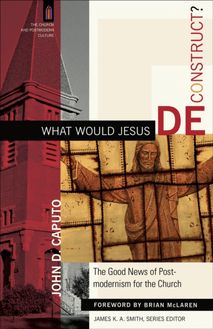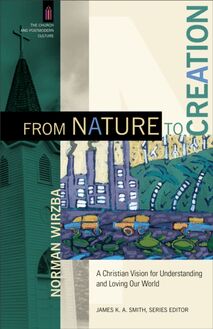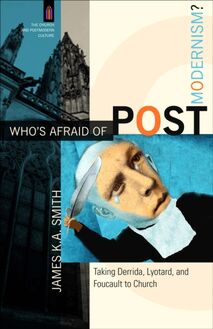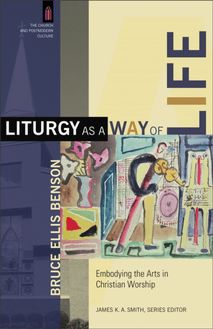-
 Univers
Univers
-
 Ebooks
Ebooks
-
 Livres audio
Livres audio
-
 Presse
Presse
-
 Podcasts
Podcasts
-
 BD
BD
-
 Documents
Documents
-
- Cours
- Révisions
- Ressources pédagogiques
- Sciences de l’éducation
- Manuels scolaires
- Langues
- Travaux de classe
- Annales de BEP
- Etudes supérieures
- Maternelle et primaire
- Fiches de lecture
- Orientation scolaire
- Méthodologie
- Corrigés de devoir
- Annales d’examens et concours
- Annales du bac
- Annales du brevet
- Rapports de stage
La lecture à portée de main
Vous pourrez modifier la taille du texte de cet ouvrage
Découvre YouScribe en t'inscrivant gratuitement
Je m'inscrisWho's Afraid of Postmodernism? (The Church and Postmodern Culture) , livre ebook
Découvre YouScribe en t'inscrivant gratuitement
Je m'inscrisEn savoir plus
Vous pourrez modifier la taille du texte de cet ouvrage
En savoir plus

Description
Sujets
Informations
| Publié par | Baker Publishing Group |
| Date de parution | 01 avril 2006 |
| Nombre de lectures | 0 |
| EAN13 | 9781441200396 |
| Langue | English |
Informations légales : prix de location à la page 0,0634€. Cette information est donnée uniquement à titre indicatif conformément à la législation en vigueur.
Extrait
Who s Afraid of Postmodernism?
THE CHURCH AND POSTMODERN CULTURE
James K. A. Smith, series editor www.churchandpomo.org
The Church and Postmodern Culture series features high-profile theorists in continental philosophy and contemporary theology writing for a broad, nonspecialist audience interested in the impact of postmodern theory on the faith and practice of the church.
Forthcoming authors and topics
Bruce Ellis Benson, associate professor of philosophy at Wheaton College, writes on improvisation as a paradigm for thinking about worship and the arts.
John D. Caputo, David C. Cook Emeritus Professor of Philosophy at Villanova University and Watson Professor of Religious Studies at Syracuse University, asks What would Jesus deconstruct?
Graham Ward, professor of contextual theology and ethics at the University of Manchester, writes on political discipleship.
Merold Westphal, distinguished professor of philosophy at Fordham University, writes on transcendence, community, and interpretation in conversation with Kierkegaard and Levinas.
Who s Afraid of Postmodernism?
Taking Derrida, Lyotard, and Foucault to Church
James K. A. Smith
Baker Academic Grand Rapids, Michigan
2006 by James K. A. Smith
Published by Baker Academic a division of Baker Publishing Group P.O. Box 6287, Grand Rapids, MI 49516-6287 www.bakeracademic.com
Printed in the United States of America
All rights reserved. No part of this publication may be reproduced, stored in a retrieval system, or transmitted in any form or by any means-for example, electronic, photocopy, recording-without the prior written permission of the publisher. The only exception is brief quotations in printed reviews.
Library of Congress Cataloging-in-Publication Data
Smith, James K. A., 1970-
Who s afraid of postmodernism? : taking Derrida, Lyotard, and Foucault to church / James K. A. Smith.
p. cm. - (The church and postmodern culture)
Includes bibliographical references (p. ) and index.
ISBN 10: 0-8010-2918-X (pbk.)
ISBN 978-0-8010-2918-9 (pbk.)
1. Postmodernism-Religious aspects-Christianity. 2. Christianity- Philosophy. 3. Derrida, Jacques. 4. Lyotard, Jean Fran ois. 5. Foucault, Michel. I. Title. II. Series. BR115.P74S66 2006 261.51-dc22 2005033865
Scripture quotations are from the Holy Bible, New International Version . NIV . Copyright 1973, 1978, 1984 by International Bible Society. Used by permission of Zondervan. All rights reserved.
For Coleson, whose dreams and visions of a fantastic world encourage me to hope for a re-imagined church
Contents
Series Preface
Preface
1. Is the Devil from Paris? Postmodernism and the Church
2. Nothing outside the Text? Derrida, Deconstruction, and Scripture
3. Where Have All the Metanarratives Gone? Lyotard, Postmodernism, and the Christian Story
4. Power/Knowledge/Discipline: Foucault and the Possibilities of a Postmodern Church
5. Applied Radical Orthodoxy: A Proposal for the Emerging Church
Annotated Bibliography: Further Reading on Postmodernism and Christian Faith
Online Resources
Series Preface
Current discussions in the church-from emergent postmodern congregations to mainline missional congregations-are increasingly grappling with philosophical and theoretical questions related to postmodernity. In fact, it could be argued that developments in postmodern theory (especially questions of post-foundationalist epistemologies) have contributed to the breakdown of former barriers between evangelical, mainline, and Catholic faith communities. Postliberalism-a related effect of postmodernism-has engendered a new, confessional ecumenism wherein we find nondenominational evangelical congregations, mainline Protestant churches, and Catholic parishes all wrestling with the challenges of postmodernism and drawing on the culture of postmodernity as an opportunity for rethinking the shape of our churches.
This context presents an exciting opportunity for contemporary philosophy and critical theory to hit the ground, so to speak, by allowing high-level work in postmodern theory to serve the church s practice-including all the kinds of congregations and communions noted above. The goal of this series is to bring together high-profile theorists in continental philosophy and contemporary theology to write for a broad, nonspecialist audience interested in the impact of postmodern theory on the faith and practice of the church. Each book in the series will, from different angles and with different questions, undertake to answer questions such as What does postmodern theory have to say about the shape of the church? How should concrete, inthe-pew and on-the-ground religious practices be impacted by postmodernism? What should the church look like in postmodernity? What has Paris to do with Jerusalem?
The series is ecumenical not only with respect to its ecclesial destinations but also with respect to the facets of continental philosophy and theory that are represented. A wide variety of theoretical commitments will be included, ranging from deconstruction to Radical Orthodoxy, including voices from Badiou to Žižek and the usual suspects in between (Nietzsche, Heidegger, Levinas, Derrida, Foucault, Irigaray, Rorty, and others). Insofar as postmodernism occasions a retrieval of ancient sources, these contemporary sources will be brought into dialogue with Augustine, Irenaeus, Aquinas, and other resources. Drawing on the wisdom of established scholars in the field, the series will provide accessible introductions to postmodern thought with the specific aim of exploring its impact on ecclesial practice. The books are offered, one might say, as French lessons for the church.
Preface
To the Reader
A word about my intended audience and modus operandi: Although I wish seriously to engage philosophical currents and ideas (in the way Francis Schaeffer faced ideas head-on) and am a philosopher by both profession and training (though also engaged in ministry for the past dozen years), in this book I am writing not primarily to philosophers or theologians (though they might find it of interest) but rather to students and practitioners- to those trying to orient themselves to the issues and those on the front lines of cultural engagement in the postmodern world: pastors and youth pastors, campus ministers and worship leaders, clergy and laypersons, and those training for such vocations. Given its original context at L Abri, the book also speaks to spiritual seekers trying to navigate the postmodern terrain while searching for meaning. To them I want to suggest that, quite unlike the anti-institutional mentality of postmodern spirituality, it is actually a robust, vibrant, liturgical church that speaks meaning in and to a postmodern world. With these audiences in mind, I have not assumed any philosophical knowledge and have avoided becoming bogged down in textual exposition. Although it is important to trace ideas to their source and listen to theorists firsthand, I have minimized footnotes and citations and concentrated on the ideas and claims being made. Of course, sources and engagement with other literature could be multiplied almost ad infinitum. But rather than distract the reader with extensive footnotes, I have included a bibliography for further reading, which will also point interested readers to my more scholarly discussions of these matters.
Acknowledgments
This book came to me, its author, as a gift-as a wonderful effulgence at the intersection of two very deep, rich streams: the heritage of the Calvin College department of philosophy and the tradition of L Abri Fellowship in Switzerland. The core of the book was initially presented as a series of lectures in the summer of 2003 at L Abri, the study center founded by Francis and Edith Schaeffer. The opportunity to give the lectures arose from a working relationship between Calvin s philosophy department and L Abri that regularly takes Calvin faculty and students to Switzerland. I am very grateful to the philosophy department, particularly Lee Hardy, for the opportunity to go to L Abri, and to the generous hospitality of Jim and Gail Ingram and the folks at L Abri for welcoming my wife, Deanna, and me. Both the faculty and the students at L Abri provided thoughtful questions and insights that have helped me to clarify my thinking on the matters examined in this book.
Throughout my preparation for those lectures, I had a keen sense of being a dwarf standing on the shoulders of giants. On the one hand, the opportunity to present those lectures was a chance to repay a debt. I find myself on the path of Christian philosophy today because of an encounter with the work of Francis Schaeffer when I was a sophomore in college. To be able to carry on that tradition of philosophical reflection, cultural analysis, and biblical discernment in the original lectures and now in this book is an attempt to render thanks and honor to Schaeffer s legacy-even if I might take that legacy in directions that Schaeffer would not. On the other hand, I count myself blessed to be part of the legacy of philosophy at Calvin College, drawing on the stream of tradition handed down from figures like Jellema, Runner, Mouw, Plantinga, and Wolterstorff. And I feel a special sense of gratitude to my contemporary colleagues in the department, who have welcomed me and encouraged me in my labors.
The transformation of the original lectures into a book has also profited from the generosity of several friends who took the time to read the manuscript and offer their comments and criticisms, which have undoubtedly improved it, except in those places where I was too stubborn to listen. My thanks to John Franke, Brian McLaren, Bill VanGroningen, and Geoff Holsclaw for this very tangible expression of friendship.
Finally, I owe much to my family for their unflagging support and for keeping me rooted in the realities of faith and practice. This book brings back special memories of a
-
 Univers
Univers
-
 Ebooks
Ebooks
-
 Livres audio
Livres audio
-
 Presse
Presse
-
 Podcasts
Podcasts
-
 BD
BD
-
 Documents
Documents
-
Jeunesse
-
Littérature
-
Ressources professionnelles
-
Santé et bien-être
-
Savoirs
-
Education
-
Loisirs et hobbies
-
Art, musique et cinéma
-
Actualité et débat de société
-
Jeunesse
-
Littérature
-
Ressources professionnelles
-
Santé et bien-être
-
Savoirs
-
Education
-
Loisirs et hobbies
-
Art, musique et cinéma
-
Actualité et débat de société
-
Actualités
-
Lifestyle
-
Presse jeunesse
-
Presse professionnelle
-
Pratique
-
Presse sportive
-
Presse internationale
-
Culture & Médias
-
Action et Aventures
-
Science-fiction et Fantasy
-
Société
-
Jeunesse
-
Littérature
-
Ressources professionnelles
-
Santé et bien-être
-
Savoirs
-
Education
-
Loisirs et hobbies
-
Art, musique et cinéma
-
Actualité et débat de société
- Cours
- Révisions
- Ressources pédagogiques
- Sciences de l’éducation
- Manuels scolaires
- Langues
- Travaux de classe
- Annales de BEP
- Etudes supérieures
- Maternelle et primaire
- Fiches de lecture
- Orientation scolaire
- Méthodologie
- Corrigés de devoir
- Annales d’examens et concours
- Annales du bac
- Annales du brevet
- Rapports de stage















